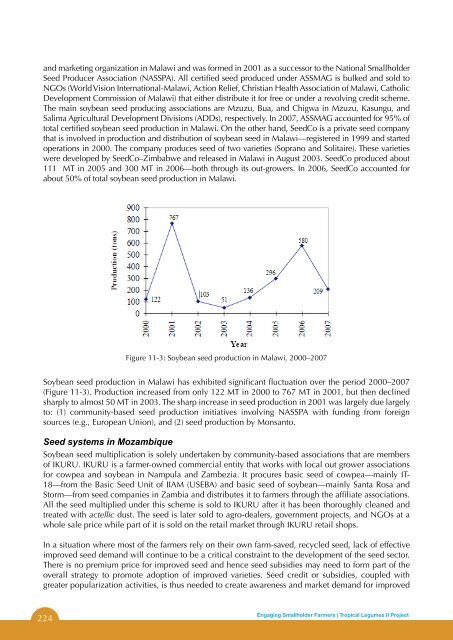Final version of Tropical Legumes II Project Report for Phase 1 - icrisat
Final version of Tropical Legumes II Project Report for Phase 1 - icrisat
Final version of Tropical Legumes II Project Report for Phase 1 - icrisat
Create successful ePaper yourself
Turn your PDF publications into a flip-book with our unique Google optimized e-Paper software.
and marketing organization in Malawi and was <strong>for</strong>med in 2001 as a successor to the National Smallholder<br />
Seed Producer Association (NASSPA). All certified seed produced under ASSMAG is bulked and sold to<br />
NGOs (World Vision International-Malawi, Action Relief, Christian Health Association <strong>of</strong> Malawi, Catholic<br />
Development Commission <strong>of</strong> Malawi) that either distribute it <strong>for</strong> free or under a revolving credit scheme.<br />
The main soybean seed producing associations are Mzuzu, Bua, and Chigwa in Mzuzu, Kasungu, and<br />
Salima Agricultural Development Divisions (ADDs), respectively. In 2007, ASSMAG accounted <strong>for</strong> 95% <strong>of</strong><br />
total certified soybean seed production in Malawi. On the other hand, SeedCo is a private seed company<br />
that is involved in production and distribution <strong>of</strong> soybean seed in Malawi—registered in 1999 and started<br />
operations in 2000. The company produces seed <strong>of</strong> two varieties (Soprano and Solitaire). These varieties<br />
were developed by SeedCo–Zimbabwe and released in Malawi in August 2003. SeedCo produced about<br />
111 MT in 2005 and 300 MT in 2006—both through its out-growers. In 2006, SeedCo accounted <strong>for</strong><br />
about 50% <strong>of</strong> total soybean seed production in Malawi.<br />
Figure 11-3: Soybean seed production in Malawi, 2000–2007<br />
Soybean seed production in Malawi has exhibited significant fluctuation over the period 2000–2007<br />
(Figure 11-3). Production increased from only 122 MT in 2000 to 767 MT in 2001, but then declined<br />
sharply to almost 50 MT in 2003. The sharp increase in seed production in 2001 was largely due largely<br />
to: (1) community-based seed production initiatives involving NASSPA with funding from <strong>for</strong>eign<br />
sources (e.g., European Union), and (2) seed production by Monsanto.<br />
Seed systems in Mozambique<br />
Soybean seed multiplication is solely undertaken by community-based associations that are members<br />
<strong>of</strong> IKURU. IKURU is a farmer-owned commercial entity that works with local out grower associations<br />
<strong>for</strong> cowpea and soybean in Nampula and Zambezia. It procures basic seed <strong>of</strong> cowpea—mainly IT-<br />
18—from the Basic Seed Unit <strong>of</strong> <strong>II</strong>AM (USEBA) and basic seed <strong>of</strong> soybean—mainly Santa Rosa and<br />
Storm—from seed companies in Zambia and distributes it to farmers through the affiliate associations.<br />
All the seed multiplied under this scheme is sold to IKURU after it has been thoroughly cleaned and<br />
treated with actellic dust. The seed is later sold to agro-dealers, government projects, and NGOs at a<br />
whole sale price while part <strong>of</strong> it is sold on the retail market through IKURU retail shops.<br />
In a situation where most <strong>of</strong> the farmers rely on their own farm-saved, recycled seed, lack <strong>of</strong> effective<br />
improved seed demand will continue to be a critical constraint to the development <strong>of</strong> the seed sector.<br />
There is no premium price <strong>for</strong> improved seed and hence seed subsidies may need to <strong>for</strong>m part <strong>of</strong> the<br />
overall strategy to promote adoption <strong>of</strong> improved varieties. Seed credit or subsidies, coupled with<br />
greater popularization activities, is thus needed to create awareness and market demand <strong>for</strong> improved<br />
224<br />
Engaging Smallholder Farmers | <strong>Tropical</strong> <strong>Legumes</strong> <strong>II</strong> <strong>Project</strong>
















